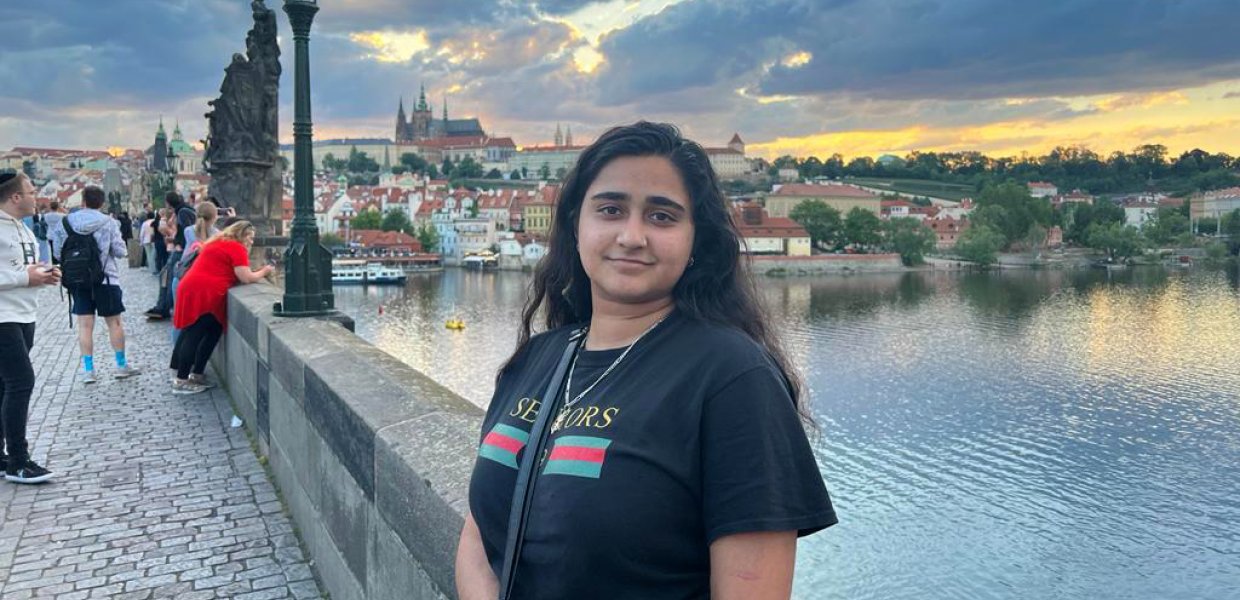Raka Bhattacharyya’s passion for communication ignited when she first realized she could not talk about her intersectional identity with her peers. A queer, second-generation daughter of Indian immigrants who was raised between the Bay Area and India, Bhattacharyya felt conditioned to be silent about her authentic self.
“I remember an event at school where you could write about a part of your identity,” she said. “I had written about Pride. Somebody told me, ‘You’re making a big deal about it. You’re talking too much.’ I think a lot of queer women of color feel like they are taking up too much space and they need to minimize their presence when being too assertive. ‘You don’t need to talk about it’ is harmful rhetoric. That impacted my relationship with communication.”
The 22-year-old is now pursuing her Master of Communication Management (MCG) at USC Annenberg where she is a Walter and Cecilia Raymond Scholarship recipient. She is excited to focus on advocating for diverse voices as well as explore organizational communication to bring back the “humanity” in today’s workplace culture. She believes USC Annenberg is the perfect place to do it.
“Annenberg has been my dream program,” she said. “It has such a strong communication management program. So, to not only be accepted into this program, but to receive a scholarship from it is an absolute honor. A dream come true.”
How has your Indian heritage influenced you?

Growing up in the U.S. and being of two different identities, it’s very difficult to make sense of where you belong. When I go to India, I’m not brown enough. Or I’m not Indian enough. I’m the child of Indian people, but not an Indian child. For example, I speak Bengali very fluently. My grandparents and parents wanted me to be in touch with my roots and always communicate in our native language. But there are a lot of people who express surprise that I am fluent. There are expectations placed on the children of Indians like; “Oh no, you can speak English, don’t force yourself to speak Bengali.” You are a unicorn. You’re treated like you are trying to prove something, even though you are not. I am not speaking Bengali to earn approval, this is my life. This is how I communicate.
How has your queer identity also impacted your need to communicate and how you are perceived by others?
For me, being gay and an Indian woman really informed how I communicate. I think there is this societal idea that we’ve all been conditioned to. When queer women of color speak, it is seen as a challenge. Asserting ourselves is seen as something people need to react to or defend against. We are conditioned to make ourselves smaller. And when we don’t, we feel outlandish.
What gave you the desire to specifically focus on communication as a field of study in your undergrad and as a master’s student at USC?
Communication is such a nebulous field. It’s like walking into Narnia. I was not aware of how many different specializations there are and how communication functions. It was really being able to take different courses at the University of Illinois at Urbana Champaign, that I could understand the scope of it. I double-majored in developmental psychology and communication. I think psych and comm are very easy to marry as fields of study. They are intrinsic to each other. Psychology can be the heart, but communication is the mouthpiece — the dialogue that comes from the heart. What I appreciate about Annenberg specifically is the value that they place on the specializations of communication. Even within MCG, I could do media studies or organizational communication. I think it’s important to know how all aspects of communication are connected.
What are your career aspirations with your MCG degree after you graduate?
I would really like to become an organizational communicator. Mediating internal or external communication at institutions. As someone who loves media, I would love to work with employees in such rapidly changing environments like Hulu or Netflix. I would also love to earn my PhD and teach organizational communication principles and diversity organizational communication theories and how to put them into practice. I’m very interested in the thought processes. The comfort. The self-efficacy of employees and of people working together in large or small institutions. That feeling of belonging, of “I’m doing a good job, and my work is valued.” That’s what makes productivity. This is so important in this time where work is online and remote. My generation, Gen Z, we’re children of the internet. For us iPad kids and internet dwellers, there is a loss of the human face in workplace dynamics. That is something that we need to be conscious about. We need to remember we are talking to a human being.
